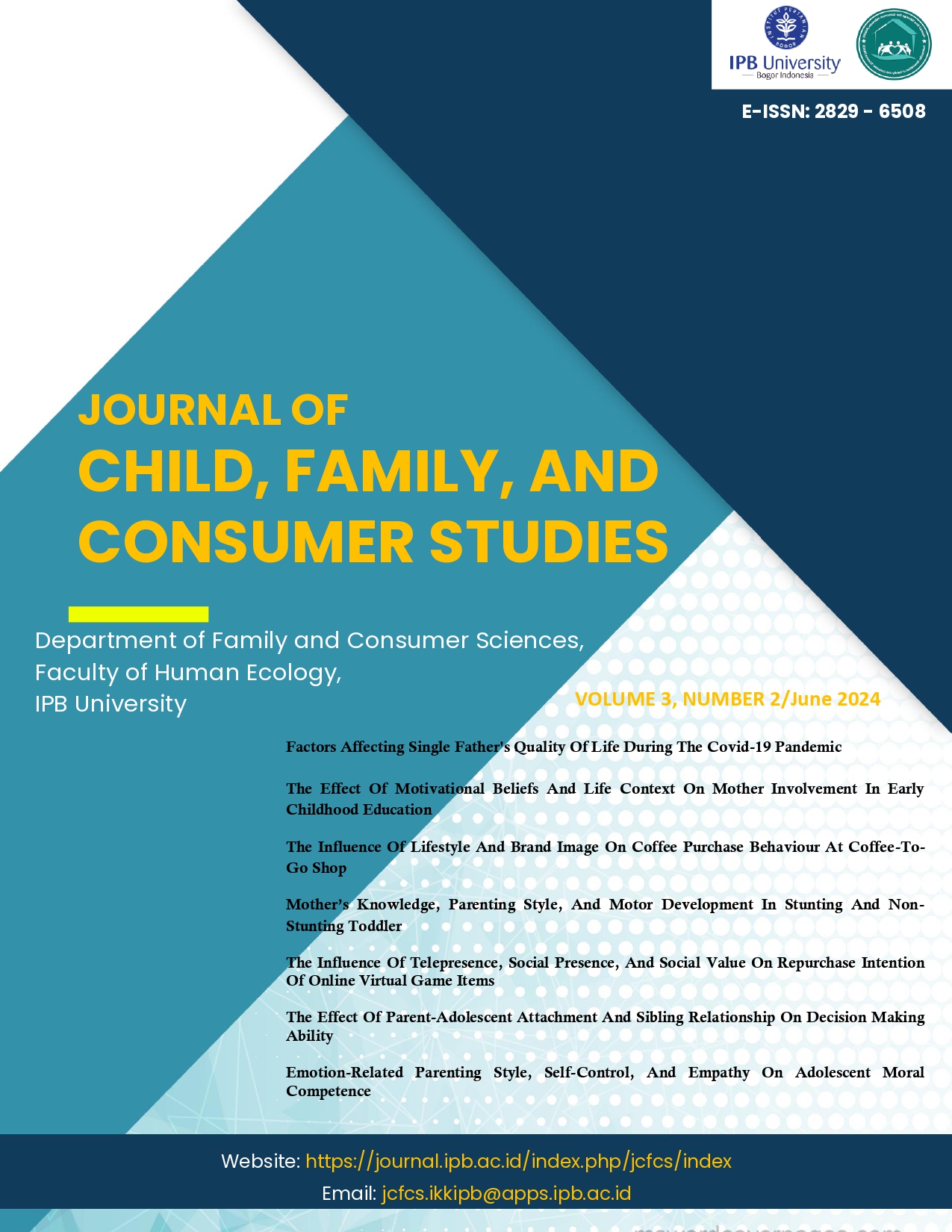MOTHER’S KNOWLEDGE, PARENTING STYLE, AND MOTOR DEVELOPMENT IN STUNTING AND NON-STUNTING TODDLER
Abstrak
The stunting rate in Indonesia is still above the maximum figure set by WHO. Stunting impacts a child's physical growth and various child developments, one of which is motor development. In general, this research aims to analyze the influence of mother knowledge and parenting style on the development of gross motor and fine motor skills in toddlers. This research used an explanatory design involving 80 examples of families with stunted and non-stunted toddlers aged 2-3 years in Sindang Barang and Bubulak Villages selected by purposive sampling. Stunted toddlers are more commonly found in boys, low maternal education, low family income, large family members, and low maternal knowledge. The correlation test results show a significant positive relationship between children's stunting status and their mother's knowledge. The father's and mother's education is related to the mother's knowledge, and the father's education and family income are associated with the authoritative parenting style. The results of the influence test show that the authoritarian parenting style significantly positively influences children's gross motor and fine motor development.
Referensi
Aldayel, A. S., Aldayel, A. A., Almutairi, A. M., Alhussain, H. A., Alwehaibi, S. A., Almutairi, T. A. (2020). Parental knowledge of children’s developmental milestones in Riyadh, Saudi Arabia. International journal of Pediatrics 2020, 1-8 https://doi.org/10.1155/2020/8889912
Alhwoaimel, N. A., Almarzoug, H., Aldukhaini, R., Altamimi, R., Aldosre, M., Al-Faris, S., Azab, A. R. (2023). Parental knowledge of children’s motor development: A cross-sectional study in Saudi Arabia. Research in Developmental Disabilities. 139:104552. https://doi.org/10.1016/j.ridd.2023.104552
Aryastami, N. K., Shankar, A., Kusumawardani, N., Besral, Jahari, A. B., Achadi, E. (2017). Low birth weight was the most dominant predictor associated with stunting among children aged 12-23 months in Indonesia. BMC Nutrition, 3(16), 1-6. doi: 10.1186/s40795-017-0130-x
Candra, A. N., Sofia, A., Anggraini, G. F. Gaya pengasuhan orang tua pada anak usia dini. Jurnal Pendidikan Anak, 3(2)
Ertem, I. O, Atay, G., Dogan, D. G., Bayhan, A., Bingoler, B. E., Gok, C.G., Ozbas, S., Haznedaragolu, D., Iskili, S. (2007). Mother’s knowledge of young child development in a developing country. Child: care, health and development, 33(6), 728-737. https://doi.org/10.1111/j.1365-2214.2007.00751.x
Farida, S. N., Peristiowati, Y., Suhita, B. M. (2019). The effect of parenting stimulation of parents and environments on rude motor development in garden children 4-6 years in the Mancar village area district of Peterongan Jombang District. Journal of Global Research in Public Health, 4(1):25-35.
Fatmawati, F. A. (2020). Pengembangan Fisik Motorik Anak Usia Dini. Gresik: Caremedia Communication.
Fitriami, E., Huriah, T. (2019). Determinan Kejadian Stunting Di Indonesia: A Literature Review. Jurnal Smart Keperawatan, 6(2), 113-121. doi:http://dx.doi.org/10.34310/jskp.v6i2.190
Forh, G., Apprey, C., Agyapong, N. A. F. (2022). Nutritional knowledge and practices of mothers/caregivers and its impact on the nutritional status of children 6-59 months in Sefwi Wiawso Municipality, Western-North Region, Ghana. Heliyon, 8(12), doi:10.1016/j.heliyon.2022.e12330
Frankenburg, W. K., Dodds, J., Archer, P., Shapiro, H., Bresnick, B., (1992). The Denver II: a major revision and restandardization of the Denver Developmental Screening Test. Pediatrics, 89(1), 91-97
Hasanah, T. (2014). Pengaruh pemberdayaan keluarga terhadap peningkatan pengetahuan perkembangan dan pengasuhan anak usia prasekolah (Tesis). Institut Pertanian Bogor, Bogor, Indonesia.
Hurlock, E. (1980). Psikologi Perkembangan. Erlangga
Husnaniyah, D., Yulyanti, D., Rudiansyah. (2020). Hubungan tingkat pendidikan ibu dengan kejadian stunting. The Indonesian Journal of Health Science, 12(1), 57-64
Indrawati, Muthmainah. (2022). Dampak gaya pengasuhan budaya barat dan timur terhadap perkembangan anak. Jurnal Pendidikan Anak Usia Dini. 6(4), 3147-3159. doi: 10.31004/obsesi.v6i4.2230
Kadir, S. (2019). The role of mother knowledge and parenting culture in determining the toddler nutrition status. Journal of Health Education, 4(2), 95-101. doi: 10.15294/jhe.v4i2.34670
Kaligid, M. T. G., Sasan, J. M., Villegas, M. A. (2022). The deteriorating effect of poor parental skills on children’s education and mental health. QALAMUNA: Jurnal Pendidikan, Sosial, Dan Agama. 14(1), 183-194. doi:10.37680/qalamuna.v14i1.1384
Kementerian Kesehatan. (2016). Pedoman pelaksanaan: stimulasi, deteksi, dan intervensi dini tumbuh kembang anak. Kementrian Kesehatan RI
[Kemenkes] Kementerian Kesehatan. (2023). Prevalensi stunting di Indonesia turun dari 21,6% dari 24,4%. Retrieved from: https://sehatnegeriku.kemkes.go.id/baca/rilis-media/20230125/3142280/prevalensi-stunting-di-indonesia-turun-ke-216-dari-244/
Murniati, Dewi, Y. P. (2017). Hubungan pengetahuan ibu balita usia 7-36 bulan tentang asi ekslusif dengan kegagalan ibu dalam memberikan asi ekslusif. Jurnal Delima Harapan, 4(2), 8-18. doi: 10.31935/delima.v4i2.22
Mustakim, M.R., Irawan, R., Irmawati, M., Setyoboedi, B. (2022). Impact of stunting on development of children between 1-3 years of age. Ethiopian journal of health sciences, 32(3), 569-578. doi:http://dx.doi.org/10.4314/ejhs.v32i3. 13
Nadia, F., Wiji, R. N., Rahayu, A. O. S. (2022). Parenting in motor development of pre-school children. Jurnal Endurance, 7(2), 261-271. doi: http://doi.org/10.22216/endurance.v7i2.877
Nahar, N. I. (2016). Penerapan teori belajar behavioristik dalam proses pembelajaran. NUSANTARA: jurnal ilmu pengetahuan sosial, 1(1), 64-74. oai:ojs.um-tapsel.ac.id:article/94
Pratiwi, A. D., & Irdawati. (2017). Hubungan pengetahuan ibu tentang bermain dengan perkembangan motorik kasar pada anak toddler. Berita Ilmu Keperawatan, 10(1), 36-43. doi:10.23917/bik.v10i1.10385
Rinaldi, C. M., Howe, N. (2012). Mothers’ and fathers’ parenting styles and associations with toddlers’ externalizing, internalizing, and adaptive behaviors. Early Childhood Research Quarterly, 27(2), 266-273. doi:10.1016/j.ecresq.2011.08.001
Robinson, C. C., Mandleco, B., Roper, S. O., Hart, C. H. (2001) The parenting styles and dimensions questionnaire (PSDQ). Handbook of Family Measurement Techniques: Vol. 3 (pp. 319-321). Thousand Oaks: Sage.
Rohmah, E. (2014). Analysis of factors affecting nutritional status toddler problems in ponorogo region. Jurnal Delima Harapan, 3(2), 28-37. doi: https://doi.org/10.31935/delima.v1i1.44
September, S. J., Rich, E. G., Roman, N. V. (2016). The role of parenting styles and socio-economic status in parents’ knowledge of child development. Early Child Development and Care, 186(7), 1060-1078. doi:10.1080/03004430.2015.1076399
Setyawati, V. A. V. (2018). Kajian stunting berdasarkan umur dan jenis kelamin di Kota Semarang. University Research Colloqium.
Sudirman, S., Ernawati, S., Justin, W. O. S., Amiruddin, A., Malik, A. (2022). Lingkungan pengasuhan dan tingkat perkembangan anak usia 4-5 tahun. JSHP: Jurnal Sosial Humaniora dan Pendidikan. 6(2), 178-189. doi:10.32487/jshp.v6i2.1447
Suryaputri, I. Y., Rosha, R. C., Anggraerni, D. (2014). Determinan kemampuan motorik anak berusia 2-5 tahun: studi kasus di keluarahan kebon kalapa Bogor. Penelitian Gizi dan Makanan, 37(1), 43-50. doi:10.22435/pgm.v37i1.4007.43-50
Syahailatua, J., Kartini, K. (2020). Pengetahuan ibu tentang tumbuh kembang berhubungan dengan perkembangan anak usia 1-3 tahun. Jurnal Biomedika Dan Kesehatan. 3(2), 77-83. doi:10.18051/JBiomedKes.2020.v3.77-83
Wahdah, S., Juffrie, M., Huriyati, E. (2016). Faktor risiko kejadian stunting pada anak umur 6-36 bulan di wilayah pedalaman Kecamatan Silat Hulu, Kapuas Hulu, Kalimantan Barat. Jurnal Gizi Dan Dietetik Indonesia (Indonesian Journal of Nutrition and Dietetics), 3(2), 119-130. doi:http://dx.doi.org/10.21927/ijnd.2015.3(2).119-130.
Xia, X. (2022). Family Income, parental education and chinese preschoolers’ cognitive school readiness: authoritative parenting and parental involvement as chain mediators. Frontiers in Psychology, 13:745093. https://doi.org/10.3389/fpsyg.2022.745093










